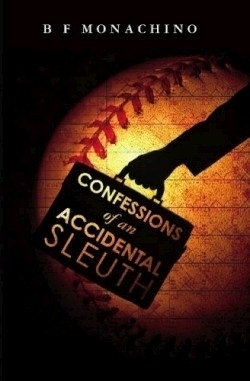Confessions of an Accidental Sleuth
Baseball and books have more in common than the letter B in B.F. Monachino’s first novel, Confessions of an Accidental Sleuth. Monachino, who was semi-finalist for Amazon.com’s Breakthrough Novel Award, was a lawyer for major companies in the States and Canada before opening her own law firm in the US. She now owns the consulting business TIPS Management, which specializes in intellectual property.
Like his creator, protagonist Harry Kramer makes his living as an attorney. However, his law practice takes a backseat to his obsessions with baseball and buying old books. While trying to procure a copy of a baseball book in memory of his late father, Harry finds a 1920s’ baseball scorecard, accompanied by a mysterious note. He gets in trouble when he purloins the scorecard from the bookstore. To ease his guilty conscience, he attempts to return the item to its rightful owner, only to find himself caught in a web of stolen books, arson, and money-laundering. Along for the ride is Harry’s financial adviser and fellow bibliophile, the lovely Maggie Parker.
Harry, Maggie, and even the minor players, all have multi-faceted personalities with distinct traits. Harry is by turns intellectual, wry, verbose, foolhardy, and lovesick. These nuances and his vividly-drawn history with his father make him come to life. The protagonist is supported by avuncular, imposing men of scholarly bearing who also jump off the page. Indeed, the villains, too, have layers. Characterization falters, however, when it comes to Maggie; Harry constantly gushes about her beauty and his unrequited love for her, reducing her to the cliché of an unobtainable, sexy lover.
The main character’s rich voice offers unique turns of phrase. In Harry’s diction, confusion becomes “the throes ofÂ….mental dishabille,” and a bookstore customer is “a bird-like blue rinse lady.” Harry also notes the eccentricities of the Big Apple and its suburbs, firmly grounding the novel’s setting.
Confessions pulls readers in and holds their attention as the plot speeds along. Monachino makes baseball history and book-collecting accessible and interesting to the uninitiated. Occasionally, though, the author interrupts the plot to explain the mechanics of processes integral to the story. Such abrupt detours jar readers out of the flow of the novel. Other stumbling blocks include trite phrasing to indicate foreshadowing and a distracting number of missing quotation marks and periods.
Overall, Confessions’ achievements overshadow its missteps. The novel’s round characters, delightful turns of phrase, strong sense of place, and detailed descriptions prove that Monachino can hold her own as a writer.
Disclosure: This article is not an endorsement, but a review. The publisher of this book provided free copies of the book and paid a small fee to have their book reviewed by a professional reviewer. Foreword Reviews and Clarion Reviews make no guarantee that the publisher will receive a positive review. Foreword Magazine, Inc. is disclosing this in accordance with the Federal Trade Commission’s 16 CFR, Part 255.

